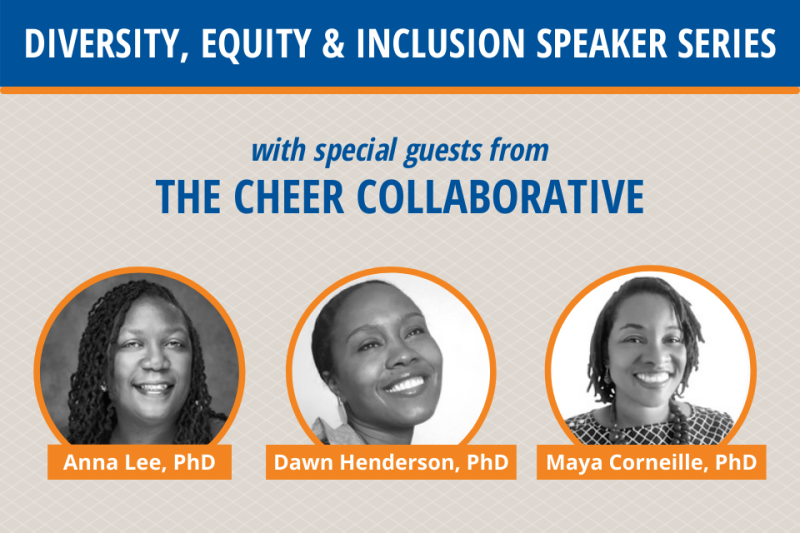
In February and March, the Department of Psychiatry & Behavioral Sciences will be hosting a three-event Diversity, Equity & Inclusion Speaker Series focused on race and language.
Our guest speakers for all three events—Maya Corneille, PhD, Dawn Henderson, PhD, and Anna Lee, PhD—are co-directors of the Collective Health and Education Equity Research (CHEER) Collaborative. The CHEER Collaborative aims to build a cadre of leaders who engage in equity-oriented practice and research, build knowledge and collective action plans to dismantle structural inequities and co-create healthy and thriving organizations and communities.
The series, open to all members of the Duke community, will run from February 1 to March 25. Event details are listed below.
Language as Racial Stress: Building Interactions that Promote Wellness
Monday, February 1, 1-2pm
Language use can convey meaning and influence beliefs toward individuals and groups. Across settings, to include learning institutions and work environments, those described as largely black (Black/African American) and brown (Latinx, Hispanic, and Native American, Native Hawaiian, etc.) encounter interpersonal and symbolic interactions where language use and symbols, either implicitly or explicitly, invalidates or interrogates their competence, intelligence, abilities, or capabilities. Moreover, increased encounters with interrogation towards expression, linguistic patterns, and even hairstyles become sources of stress and can trigger previous memories of other adverse race-related experiences.
This session will provide examples extracted from interviews and stories gathered from racially and ethnically diverse adults and how language use and symbols function as racial stressors. The presenters will discuss how resistance and reframing strategies help people deal with such racial stressors but also provide guidance on how individuals can reduce the use of racialized and harmful language/symbols.
Transforming Deficit Language to Highlight Strengths and Assets
Thursday, March 11, 9:30-10:30am
A foundational pillar to the Truth, Racial Healing, & Transformation movement in the U.S. is narrative change; changing the narrative is essential in changing the research conducted with those who have been raced/racialized in the U.S. Unfortunately, the dominant narrative on those who have been described as largely black (Black/African American)/brown (Latinx, Hispanic, and Native American, Native Hawaiian, etc.) centers on creating research and narratives about their lives, their culture, and ways of being from a deficit and deviant lens.
This session will illuminate how the language used in research and practice only reifies narratives that do not acknowledge and recognize the assets, collective and cultural resources and strengths. The presenters will introduce the Detoxifying and Empowering Language Framework to facilitate how language can be toxic to the wellbeing and health of communities and implications on research and practice.
Reframing Language for Equity and Empowerment
Thursday, March 25, 9:30-10:30am
Language informs social interactions and evokes meaning symbolically across every aspect of our lives. For example, language use can reinforce hierarchies of power and biased assumptions towards groups. The language used in both practice and research can be detrimental to the wellbeing of groups when it reinforces subjugation, deficits and dehumanization versus agency, resistance and resilience.
This session will illuminate the challenges in current language use in research and practice (i.e., emphasis on health research and practice) and provide examples of how to reframe language in ways that promote empowerment and equity. The presenters will present the Detoxifying and Empowering Language Framework to facilitate a critical analysis of language used in research and practice and provide action steps to help participants reframe language in ways that honor collective and cultural resources, assets of diverse groups.
NOTE: This session was not recorded.
Questions? Please contact Annise Weaver at annise.weaver@duke.edu or Dr. Ernestine Briggs-King at ernestine.briggs@duke.edu.